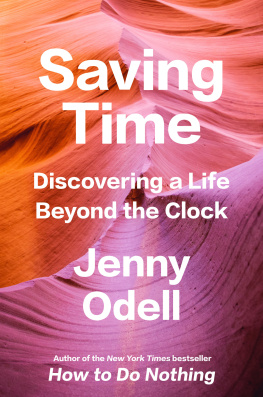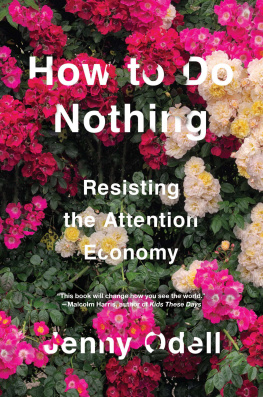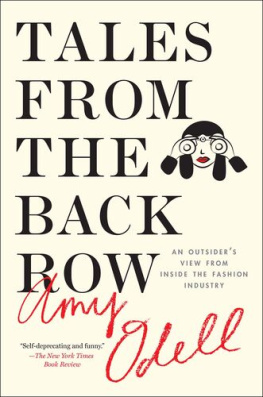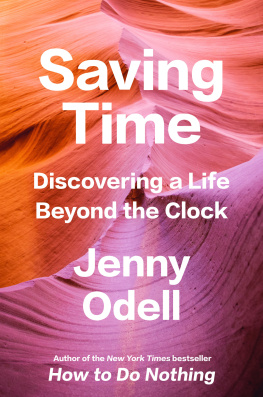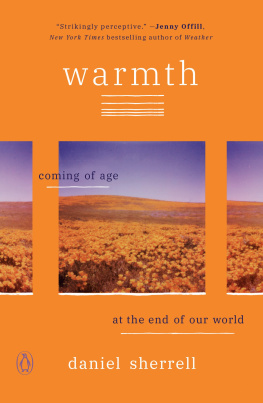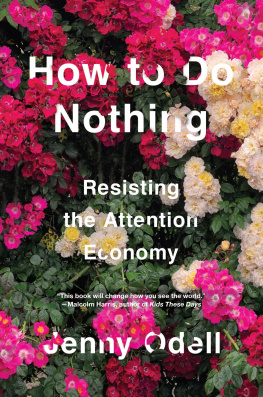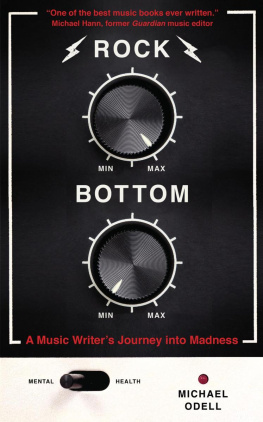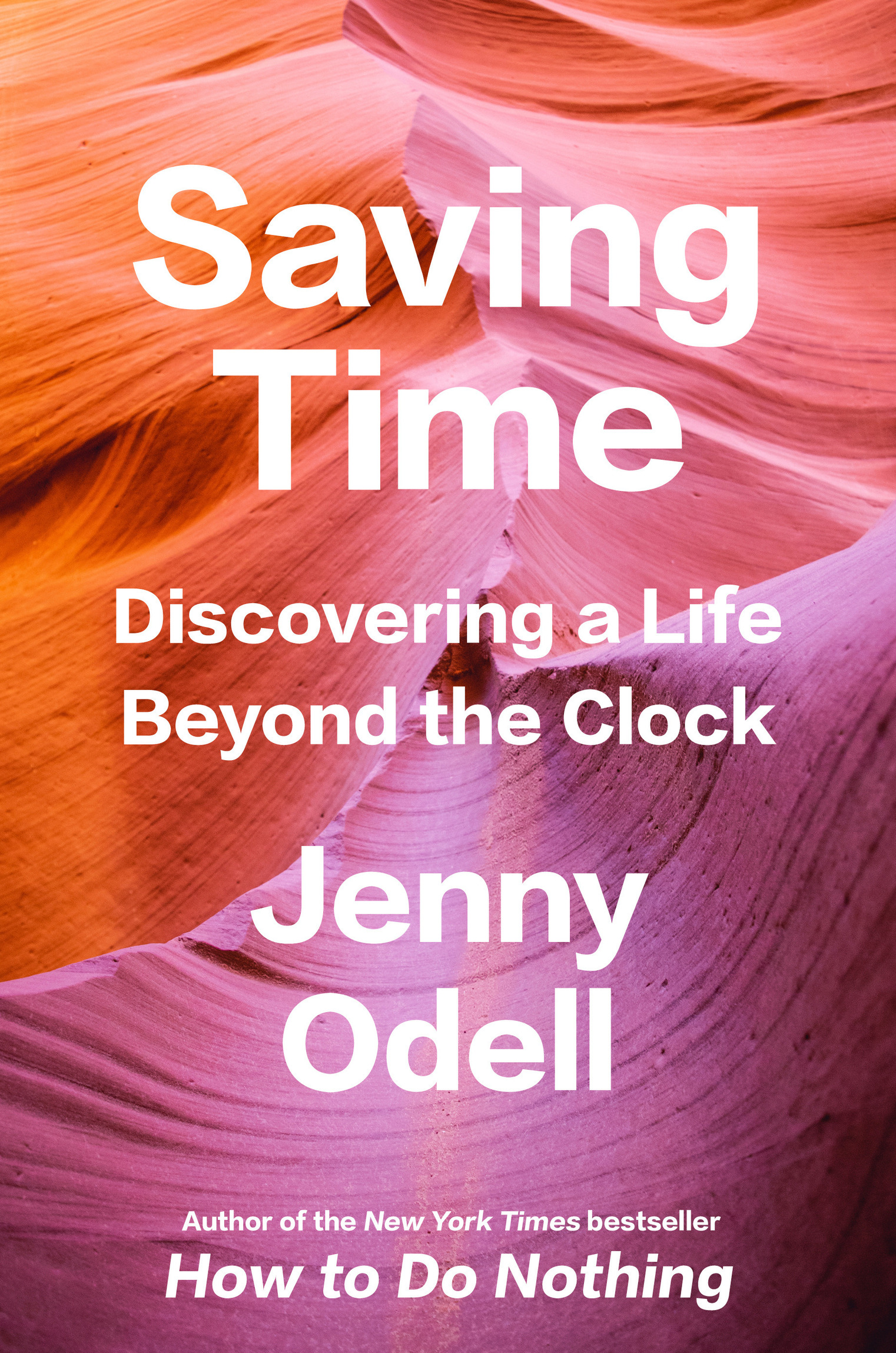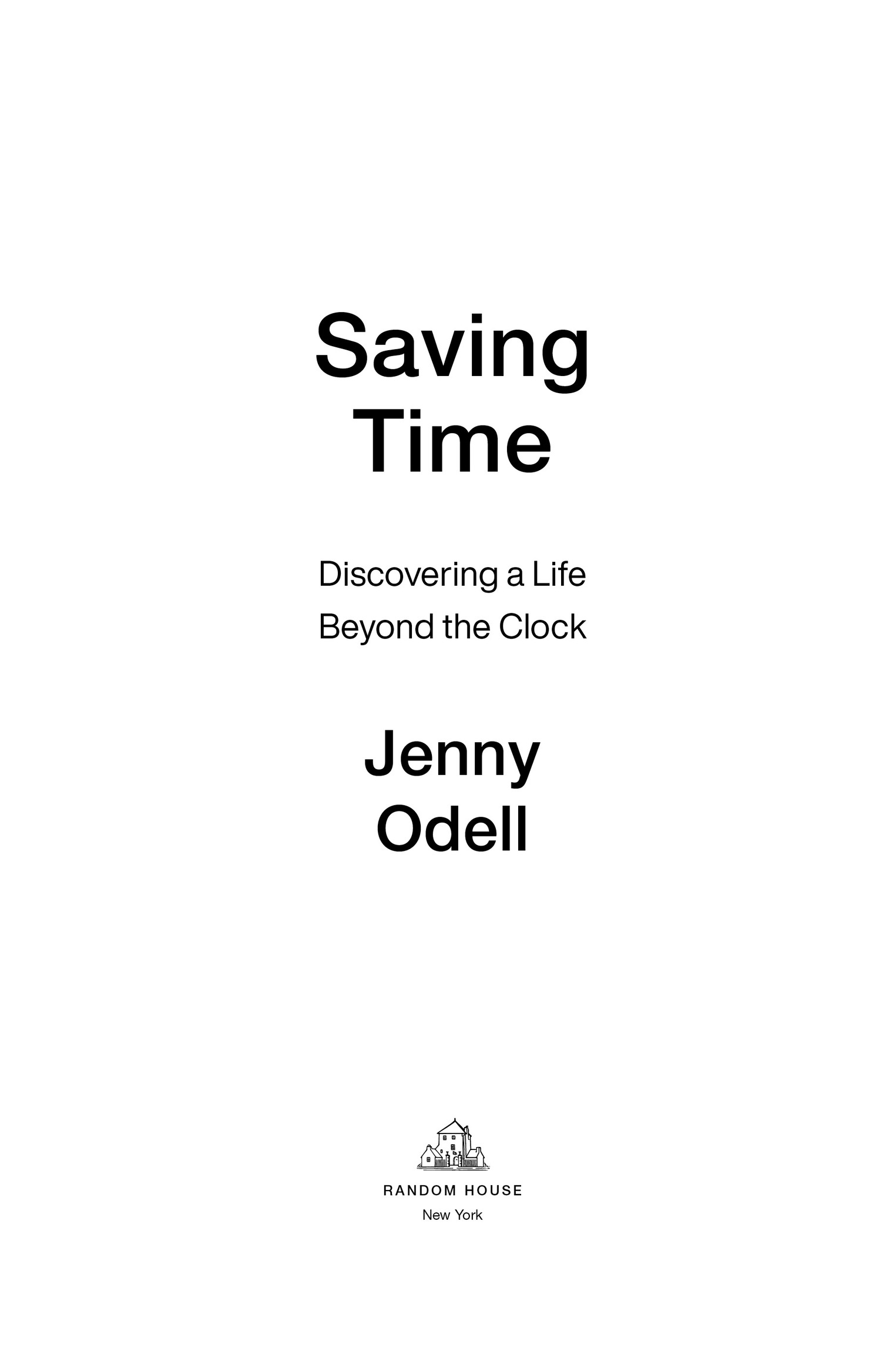Contents
Landmarks
Print Page List
Copyright 2023 by Jennifer Odell
All rights reserved.
Published in the United States by Random House, an imprint and division of Penguin Random House LLC, New York.
Random House and the House colophon are registered trademarks of Penguin Random House LLC.
Library of Congress Cataloging-in-Publication Data
Names: Odell, Jenny (Multimedia artist) author.
Title: Saving time: discovering a life beyond the clock / Jenny Odell.
Description: First Edition. | New York: Random House [2023] | Includes bibliographical references and index.
Identifiers: LCCN 2022030261 (print) | LCCN 2022030262 (ebook) | ISBN 9780593242704 (hardcover) | ISBN 9780593242711 (ebook)
Subjects: LCSH: Time. | TimePhilosophy.
Classification: LCC BF468.O34 2023 (print) | LCC BF468 (ebook) | DDC 153.7/53--dc23/eng/20230209
LC record available at https://lccn.loc.gov/2022030261
LC ebook record available at https://lccn.loc.gov/2022030262
International edition ISBN9780593597224
randomhousebooks.com
Design by Fritz Metsch, adapted for ebook
Cover design: Lucas Heinrich
Cover photograph: Jn Bako/EyeEm/Getty Images
ep_prh_6.0_142781534_c0_r2
Contents
_142781534_
I wish the idea of time would drain out of my cells
and leave me quiet even on this shore.
agnes martin , Writings
Introduction
A Message for the Meantime
A t some point in the spring of 2019, I noticed that my apartment had received some unexpected visitors. They likely arrived not through the door but through the window, and for a long time, I didnt know they were there. It was not until I happened to see the fronds of a moss growing in a pig-shaped ceramic planter next to the window that I had any idea wed been invaded.
The moss spores took up residence around a tiny bunny ear cactus a friend had given me for my birthday years earlier. Id always hated how cold and damp the area next to my kitchen window wasit never gets any sunand the cactus probably did, too, but the moss found it hospitable. It set about dividing, differentiating, grabbing hold of the potting soil with hairlike rhizoids and growing tiny green leaves. Then it sent up long, slender sporophytes, ready to continue the same process as its ancestors outside the apartment. Soon, a miniature forest was fairly bursting from the top of the pig.
Compared to vascular plants, mosses have a relatively unmediated relationship to water and air. In her book Gathering Moss, Robin Wall Kimmerer notes that the one-cell-thick leaves of mosses are like the alveoli of human lungs, given that they require moisture and come into direct contact with air. On Antarctica, which has no trees, scientists have used mosses in a similar manner to tree rings. The mosses are capable of laying down a record each summer because of the way their leaves take in chemicals from the surroundings, growing from their tips. Sitting in my kitchen, I obviously could not read the record this errant moss was writing, but it did at least tell me, Im alive. And the next day: Still alive.
I reread Gathering Moss during the early lockdowns of the Covid-19 pandemic. Time felt frozen then, but the moss kept growing, both inside and outside the apartmentand the pandemic had shrunk the scale of my attention. I walked around Oakland like a pedestrian conspiracy theorist, peering at things from odd angles. Moss loved the interstices, which meant it was often exactly where I wouldnt think to look: between cracks in the walkway outside my apartment, between the asphalt of the road and the manhole cover, between the grocery store wall and the sidewalk, between bricks. I came to understand moss as the signature of water, both in placement and appearance, as it grew wherever water had collected in the past, but it also answered the rain in real time, expanding and turning greener within minutes of a light shower.
The moss made me consider both very short timescaleslike the minute-to-minute changes in moisture, or the moment of a spore growing in my planterand very long evolutionary timescales, as mosses were some of the very first plants to live on land. Yet both ends of the temporal spectrum were also reminders of how impossible it is to pinpoint a moment (a very human thing to want to do). On one end, for example, I found disagreement about when a moss spore has officially germinated. Is it when it has become swollen with water to a certain degree or when the germ tube forms and the cell wall ruptures? On the other end, the earliest mosses evolved from aquatic algae at some point hundreds of millions of years ago, but it would be absurd to try to identify the exact moment of this innovation or even the speciation of the guest on my windowsill.
This slipperiness easily spilled over into other questions. Could a moss be meaningfully separated from its surroundings? Was a moss spore considered alive? What about a moss that was frozen, like the one from Antarctica that was brought back to life after fifteen hundred years? Even outside extreme conditions, mosses complicate the idea of uniform time with the ability of some species to go dormant for more than a decade without water; under the right circumstances, they will revive. It was this very quality, as Kimmerer mentioned in a 2020 interview in The Believer, that made moss especially worth paying attention to during the Covid-19 pandemic. Noting that her students took inspiration from mosses rootedness and dormancy, Kimmerer suggested that these plants could teach humans how to inhabit this historical moment.
The moss arrived in my apartment around the time I started thinking about this book. It was still growing when I finished. True, it will probably not live in that spot for five thousand years, as has one moss shelf on Elephant Island, in Antarctica. But in the long meantime, it has taken in three years of sunlight, breathed three years of air, and witnessed three years of me at the kitchen table. Like an emissary from somewhere outside clock time, it has populated my mind with questions of porousness and response, of inside and outside, of potentiality and imminence. Most of all, it has been a reminder of time: not the monolithic, empty substance imagined to wash over each of us alone, but the kind that starts and stops, bubbles up, collects in the cracks, and folds into mountains. It is the kind that waits for the right conditions, that holds always the ability to begin something new.
IMAGINE YOURE AT a bookstore. In one section are time management books that give advice for adapting to a general sense of time scarcity and a world always speeding up: either counting and measuring your bits of time more effectively or buying time from other people. In a different section, you find cultural histories of how we came to see time the way we do and philosophical inquiries into what time even is. If youre scrabbling for time and feeling burned out, which section would you turn to? It would seem to make sense to look in the first section, which is more directly concerned with everyday life and practical reality. Ironically, there never seems to be enough time to do something as idle as contemplate the very nature of time. But what I want to suggest is that some of the answers we might seek in the first section live in the second. Thats because, without exploring the social and material roots of the idea that time is money, we risk entrenching a language about time that is itself part of the problem.

